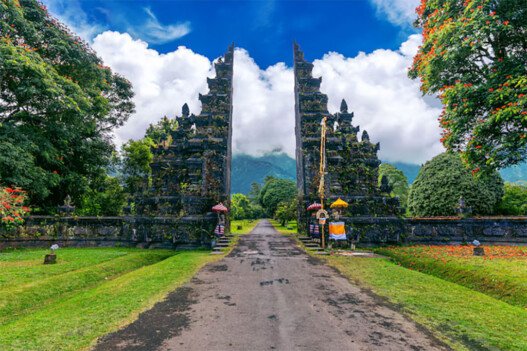Discover the vibrant pulse of Balinese culture through its bustling night markets
🎭 Introduction: When Bali Comes Alive After Dark
As the tropical sun sets over the Island of the Gods, a different kind of magic begins to unfold. The air fills with the aromatic symphony of sizzling satay, bubbling gudeg, and freshly ground spices. Neon lights flicker to life, casting colorful reflections on wet pavement as vendors arrange their wares with practiced precision. Welcome to Bali’s night markets – the beating heart of local culture where authentic flavors, incredible bargains, and unforgettable experiences await every traveler brave enough to venture beyond the tourist trail.
Night markets in Bali are far more than shopping destinations; they’re cultural theaters where generations of tradition play out nightly. Here, elderly warungs owners serve recipes passed down through families, young entrepreneurs hawk the latest gadgets, and travelers from around the world gather to experience the real Bali that exists beyond the resort walls.
🗺️ The Ultimate Guide to Bali’s Premier Night Markets
🏮 Pasar Malam Gianyar: The Crown Jewel of Night Markets
Located in the cultural heart of Gianyar Regency, this sprawling night market operates every evening from 6 PM to midnight, transforming a quiet residential area into a buzzing epicenter of commerce and cuisine. Spanning over three city blocks, Pasar Malam Gianyar attracts both locals and savvy tourists who’ve discovered its incredible offerings.
What Makes It Special:
- Authentic Balinese Street Food: This market boasts the island’s most comprehensive collection of traditional dishes, from bebek betutu (slow-roasted duck) to lawar (traditional mixed salad with coconut and spices)
- Unbeatable Prices: Vendors here cater primarily to locals, meaning prices remain refreshingly reasonable compared to tourist-heavy areas
- Cultural Immersion: The market maintains its traditional character, with many stalls run by families who’ve been selling here for decades
Must-Try Foods: Sate lilit (minced meat satay wrapped around bamboo sticks), nasi campur Bali (mixed rice with various side dishes), and es campur (shaved ice dessert with tropical fruits and condensed milk).
🌊 Pasar Senggol Gianyar: The Seafood Paradise
Just a short distance from the main Gianyar market, this specialized night market focuses primarily on fresh seafood and grilled specialties. Operating from 7 PM to 1 AM, it’s where local fishing families bring their daily catch to be transformed into culinary masterpieces.
Signature Experiences:
- Choose Your Own Adventure: Select live fish, prawns, or crabs from bubbling tanks and have them prepared to your specifications
- Jukung Dining: Some vendors serve meals on traditional wooden boats, creating an immersive dining experience
- Cooking Classes: Several stalls offer impromptu cooking lessons where you can learn to prepare Balinese seafood dishes
🎪 Pasar Malam Sukawati: The Artisan’s Haven
This unique night market combines commerce with culture, operating Wednesday through Sunday from 6 PM to 11 PM. Located near the famous Sukawati Art Market, it transforms into an evening showcase of local craftsmanship and culinary artistry.
Special Features:
- Live Performances: Traditional gamelan orchestras and Balinese dancers perform throughout the evening
- Artisan Workshops: Watch skilled craftspeople create batik, wood carvings, and silver jewelry before your eyes
- Farm-to-Table Philosophy: Many food vendors source ingredients from nearby organic farms, ensuring exceptional freshness
🍜 Culinary Adventures: A Food Lover’s Paradise
🔥 Street Food Essentials You Cannot Miss
Gado-Gado Bali Style 🥗 Unlike its Javanese cousin, Balinese gado-gado incorporates local vegetables like kangkung (water spinach) and bean sprouts, topped with a spicy peanut sauce that includes tamarind and palm sugar. Night market versions often add crispy keropok (crackers) and fried tofu for extra texture.
Ayam Betutu 🐔 This ceremonial dish involves marinating whole chicken in a complex spice paste including turmeric, ginger, galangal, and candlenuts, then slow-roasting it wrapped in aromatic spices and banana leaves. The result is incredibly tender meat with deep, complex flavors that represent the pinnacle of Balinese cuisine.
Rujak Manis 🍍 This refreshing fruit salad combines tropical fruits like mango, pineapple, water apple, and cucumber with a sweet and spicy dressing made from palm sugar, tamarind, chili, and peanuts. It’s the perfect antidote to Bali’s tropical heat.
Pisang Rai 🍌 Steamed bananas wrapped in grated coconut and served with palm sugar syrup, this traditional dessert showcases the island’s abundant tropical produce while satisfying any sweet tooth.
🥤 Refreshing Beverages for Tropical Nights
Es Kelapa Muda 🥥 Fresh young coconut water served straight from the shell, often with coconut meat and a splash of condensed milk. It’s nature’s perfect sports drink, packed with electrolytes.
Jamu Tradisional 🌿 These traditional herbal drinks combine turmeric, ginger, tamarind, and other medicinal herbs. Each blend serves different purposes – some boost immunity, others aid digestion, and many provide natural energy.
Es Cendol 🍧 This iconic Indonesian dessert drink features green rice flour jelly, coconut milk, palm sugar syrup, and shaved ice. The combination of textures and the subtle sweetness make it incredibly refreshing.
💰 Shopping Smart: Getting the Best Deals
🤝 The Art of Negotiation
Bargaining in Balinese night markets is both expected and respected when done properly. The key is approaching negotiations with respect, humor, and cultural sensitivity.
Golden Rules for Successful Bargaining:
- Start with a Smile: Friendly interaction sets a positive tone
- Learn Basic Bahasa Indonesia: Simple phrases like “Boleh kurang?” (Can you reduce the price?) show respect for local culture
- Know Fair Prices: Research typical costs beforehand to avoid overpaying or insulting vendors with lowball offers
- Buy Multiple Items: Vendors often provide better deals for bulk purchases
- Be Prepared to Walk Away: Sometimes the best deals come when you’re genuinely ready to leave
🛍️ What to Buy and Where
Textiles and Clothing 👘
- Batik shirts and dresses: Look for hand-drawn patterns rather than stamped designs
- Traditional sarongs: Essential for temple visits and make beautiful home décor
- Lace kebaya: Elegant traditional Balinese blouses perfect for special occasions
Handicrafts and Souvenirs 🎨
- Wood carvings: From small trinkets to elaborate sculptures depicting Hindu deities
- Silver jewelry: Celuk village artisans create intricate designs using traditional techniques
- Coconut shell crafts: Bowls, cups, and decorative items that showcase sustainable artistry
Spices and Food Products 🌶️
- Sambal varieties: Take home authentic Balinese chili pastes
- Coffee beans: Bali produces exceptional single-origin coffee, especially from the Kintamani region
- Traditional snacks: Keripik (chips) made from fruits and vegetables make great gifts
🕐 Timing Your Visit: When to Go for Maximum Experience
📅 Best Days of the Week
Weekends (Friday-Sunday): Markets are most vibrant with the largest selection of vendors and food options. However, expect bigger crowds and slightly higher prices.
Weekdays (Tuesday-Thursday): Quieter atmosphere allows for better interaction with vendors and more relaxed browsing. Prices may be more negotiable, but some specialty vendors might not be present.
Monday: Many markets are closed or operate with limited vendors as it’s traditionally a day of rest.
⏰ Optimal Hours
7:00-8:30 PM: Peak dining time when food is freshest and vendors are most energetic. This is when you’ll find the best selection of hot food and the most lively atmosphere.
8:30-10:00 PM: Perfect for shopping as the dinner rush subsides but vendors are still fully stocked. Prices may become more negotiable as vendors want to clear inventory.
After 10:00 PM: Late-night snacks and desserts take center stage. Some vendors offer discounts on remaining food items, but selection becomes limited.
🚗 Getting There: Transportation and Logistics
🏍️ Transportation Options
Motorbike (Recommended): Provides maximum flexibility and authentic local experience. Most night markets have designated parking areas with attendants (typically 2,000-5,000 IDR parking fee).
Taxi or Grab: Convenient and safe, especially for evening outings. However, some markets are located in narrow streets where cars cannot easily access.
Tour Groups: Several local companies offer night market tours that include transportation, translation services, and cultural explanations.
🅿️ Parking and Safety Tips
- Arrive before 7 PM to secure good parking spots
- Keep motorbike keys and valuables secure
- Use well-lit parking areas with attendants
- Take a photo of your parking location to remember where you left your vehicle
- Consider bringing a small lock for extra security
🛡️ Safety and Cultural Etiquette
🙏 Respecting Local Customs
Dress Appropriately: While night markets are casual, avoid overly revealing clothing out of respect for local customs. Shoulders and knees should be covered, especially when visiting markets near temples.
Photography Ethics: Always ask permission before photographing vendors or their food. Many are happy to pose, but respect those who decline.
Religious Considerations: Some markets operate near active temples. Be mindful of ongoing ceremonies and maintain respectful noise levels.
🏥 Health and Safety Precautions
Food Safety: Choose vendors with high turnover and hot, freshly cooked food. Look for busy stalls where locals eat – they know which places maintain high standards.
Water and Ice: Stick to bottled water and avoid ice in drinks unless you’re confident about the source.
Cash Management: Bring small bills (denominations of 50,000 IDR and below) for easier transactions. Keep money in multiple locations and avoid displaying large amounts.
Emergency Contacts: Save local emergency numbers and the contact information of your accommodation before heading out.
🌟 Hidden Gems: Lesser-Known Markets Worth Discovering
🎯 Pasar Malam Ubud Monkey Forest Road
This smaller, intimate market operates Thursday through Sunday and caters to both locals and conscious travelers seeking authentic experiences without massive crowds.
Unique Features:
- Organic produce section featuring pesticide-free fruits and vegetables
- Vegan and vegetarian-friendly food options
- Local musicians and artists showcase their talents
- Educational workshops about Balinese cooking and culture
🌺 Pasar Malam Sanur Beach
A beachfront market that combines ocean views with culinary delights, operating Friday through Sunday from 6 PM to midnight.
Special Appeals:
- Beachside dining with sand between your toes
- Fresh seafood grilled over coconut husks
- Sunset views while enjoying dinner
- Traditional Balinese music performances
🏔️ Pasar Malam Bedugul
Located in Bali’s cooler mountain region, this market operates Saturday and Sunday evenings, offering a different perspective on Balinese night market culture.
Distinctive Characteristics:
- Mountain vegetables and temperate climate produce
- Warmer clothing and sweaters for sale (useful in the cooler mountain air)
- Lake fish specialties unique to the region
- Stunning mountain backdrop for your market experience
🎉 Seasonal Celebrations and Special Events
🏮 Galungan and Kuningan Festivals
During these important Hindu holidays, night markets transform into celebration centers with special ceremonial foods, decorative items, and festive atmospheres.
Special Festival Foods:
- Lawar: Ceremonial mixed salad prepared in large quantities
- Ketupat: Diamond-shaped rice cakes wrapped in coconut leaves
- Jaja: Traditional ceremonial cakes and sweets
🎊 Nyepi Preparations
In the weeks leading up to Nyepi (Balinese New Year), markets buzz with activity as families prepare for the day of silence.
Pre-Nyepi Market Features:
- Ogoh-ogoh (demon effigies) construction materials and decorations
- Traditional white clothing for temple ceremonies
- Special cleansing herbs and incense
- Extra food supplies for the preparation day
📱 Modern Conveniences: Tech Tips for Market Navigation
💳 Payment Methods
Cash is King: Most vendors only accept Indonesian Rupiah in cash. ATMs are available near major markets, but it’s wise to come prepared.
Mobile Payments: Some younger vendors now accept GoPay, OVO, or Dana, but don’t rely on this exclusively.
Currency Exchange: Exchange money at official money changers before visiting markets for better rates than tourist areas.
📞 Useful Apps
Google Translate: Camera translation feature helps with menu items and price negotiations
Maps.me: Offline maps ensure you can navigate even without internet connection
Indonesian Language Apps: Basic Bahasa Indonesia phrases enhance your market experience significantly
Currency Converter: Real-time exchange rates help with quick price calculations
🍽️ Creating Your Own Night Market Food Tour
📋 Planning Your Culinary Adventure
The Progressive Dinner Approach: Visit multiple stalls throughout the evening, trying small portions from each to maximize variety.
Sample Itinerary:
- 7:00 PM: Start with refreshing drinks and light appetizers
- 7:30 PM: Try signature main dishes from 2-3 different vendors
- 8:30 PM: Explore side dishes and vegetables
- 9:00 PM: Sample desserts and sweet treats
- 9:30 PM: End with traditional coffee or herbal drinks
👥 Group Dining Strategies
Sharing is Caring: Order different dishes to share among your group, allowing everyone to taste more varieties
Dietary Accommodations: Most vendors can modify dishes for vegetarians, but vegans should research options beforehand
Budget Planning: Allocate 150,000-300,000 IDR per person for a comprehensive food tour experience
🌍 Environmental Consciousness: Sustainable Market Practices
♻️ Eco-Friendly Shopping Tips
Bring Your Own Bags: Reduce plastic waste by carrying reusable shopping bags
Choose Banana Leaf Packaging: Many traditional vendors still use banana leaves instead of plastic containers
Support Local Producers: Prioritize vendors selling locally-grown produce and handmade items
Avoid Single-Use Plastics: Bring your own water bottle and utensils when possible
🌱 Supporting Sustainable Vendors
Look for vendors who:
- Use biodegradable packaging materials
- Source ingredients from local organic farms
- Employ traditional, environmentally-friendly cooking methods
- Support local artisan communities
📸 Capturing the Perfect Night Market Experience
📷 Photography Tips
Golden Hour Magic: Arrive early to catch the transition from daylight to artificial lighting
Candid Moments: Focus on capturing authentic interactions between vendors and customers
Food Photography: Use natural light when possible and avoid flash, which can wash out colors
Street Scene Compositions: Include context like market signs, crowds, and architectural elements
🎥 Video Documentation
Time-Lapse Sequences: Show the market coming to life as vendors set up their stalls
Cooking Process Videos: Document the preparation of signature dishes from start to finish
Cultural Interviews: With permission, interview vendors about their family recipes and traditions
🎓 Learning Opportunities: Beyond Shopping and Eating
👨🍳 Cooking Classes and Workshops
Many markets offer informal cooking lessons where vendors teach visitors to prepare traditional dishes. These experiences provide deeper cultural understanding while developing practical skills.
Popular Learning Opportunities:
- Spice identification and usage workshops
- Traditional cooking technique demonstrations
- Family recipe sharing sessions
- Balinese food history and cultural significance discussions
🏛️ Cultural Education
Night markets serve as living museums where visitors can learn about:
- Traditional Indonesian commerce practices
- Regional variations in cuisine and culture
- Economic systems and local entrepreneurship
- Social dynamics and community relationships
🏨 Accommodation Tips: Staying Near the Action
🛏️ Strategic Location Planning
Within Walking Distance: Choose accommodations within 1-2 kilometers of major night markets for easy access
Transportation Hubs: Stay near areas with good motorbike rental availability or public transportation
Cultural Immersion: Consider homestays or local guesthouses for authentic experiences
🏡 Recommended Areas
Gianyar Region: Close to the best night markets with authentic local atmosphere
Ubud Surroundings: Balance between cultural attractions and market accessibility
Sanur Area: Beach proximity combined with evening market options
🎯 Conclusion: Embracing Bali’s After-Dark Culture
Bali’s night markets represent far more than convenient places to shop and eat; they’re windows into the soul of Balinese culture. Here, ancient traditions blend seamlessly with modern life, creating experiences that engage all the senses while providing genuine connections with local communities.
Whether you’re seeking authentic culinary adventures, unique shopping opportunities, or simply want to experience Bali as locals do, the island’s night markets offer unparalleled access to authentic Indonesian culture. From the bustling energy of Pasar Malam Gianyar to the intimate charm of smaller neighborhood markets, each venue provides its own unique perspective on Balinese life.
The key to maximizing your night market experience lies in approaching these spaces with openness, respect, and curiosity. Come hungry not just for food, but for cultural understanding. Bring patience for language barriers and enthusiasm for new experiences. Most importantly, remember that you’re not just a tourist consuming experiences – you’re a temporary participant in centuries-old traditions that continue to thrive in modern Bali.
As you navigate these vibrant markets, sampling exotic flavors and negotiating for handcrafted treasures, you’ll discover that the greatest bargain isn’t a discounted souvenir or a perfectly spiced meal – it’s the authentic connection to a culture that remains vibrantly alive in every sizzling wok, every warm smile, and every shared moment under the tropical stars.
So when the sun sets over Bali’s mystical landscape and the first market lights begin to twinkle, venture beyond your comfort zone and into the heart of Balinese culture. The night markets are waiting, ready to share their secrets with those brave enough to seek authentic adventure in the Island of the Gods.
Ready to explore Bali’s incredible night markets? Pack your appetite for adventure and prepare for an unforgettable journey through authentic Indonesian culture, one delicious bite at a time.









